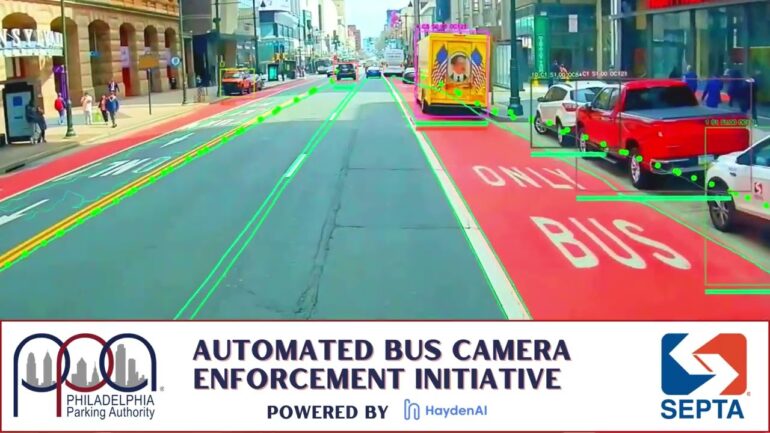The Southeastern Pennsylvania Transportation Authority piloted a new enforcement tool in Philadelphia in 2023: AI-powered cameras mounted on seven of its buses. The results were immediate and dramatic: In just 70 days, the cameras flagged over 36,000 cars blocking bus lanes.
The results of the pilot gave the transportation authority, also called SEPTA, valuable data into bus route obstruction and insights into the role of technology to combat these problems.
In May 2025, SEPTA and the Philadelphia Parking Authority officially launched the program citywide. More than 150 buses and 38 trolleys across the city are fitted with similar artificial intelligence systems that scan license plates for possible violations. The system uses AI-powered cameras that use computer vision technology to spot vehicles blocking bus lanes and scans license plates to identify the vehicles breaking the rules. If the system flags a possible infraction, a human reviewer confirms it before a fine is issued: US$76 in Center City, $51 elsewhere.
This rollout comes as SEPTA faces a $213 million budget shortfall, with imminent service cuts and fare hikes.
I’m a professor of information systems and the academic director of LeBow College of Business’s Center for Applied AI and Business Analytics at Drexel University. The center’s research focuses on how organizations use AI, and what that means for trust, fairness and accountability.
In a recent survey the center conducted with 454 business leaders from industries including technology, finance, health care, manufacturing and government, we found that the use of AI is often rolled out faster than the governance needed to make sure it works fairly and transparently.
That gap between efficiency and oversight is especially common in public-sector organizations, according to our survey.
That’s why I believe it’s important for SEPTA to manage its AI enforcement system carefully to earn public trust, while minimizing risks.
Fairness and transparency
When cars block a bus lane, they clog traffic. The resulting delays can mess up a person’s day, causing missed connections or making riders late for work. That can leave riders with the feeling they can’t rely on the transit system.
So, if AI enforcement helps keep those lanes clear, it’s a win. Buses move faster, and commutes are quicker.
A promo video for the Southeastern Pennsylvania Transportation Authority and Philadelphia Parking Authority’s new camera system that detects cars blocking bus lanes.
But here’s the issue: Good intentions don’t work if the system feels unfair or untrustworthy. Our survey also found that more than 70% of the surveyed organizations don’t fully trust their own data. In the context of public enforcement, whether it’s transit agencies or parking authorities, that’s a warning sign.
Without trustworthy data, AI-powered ticketing can turn…



